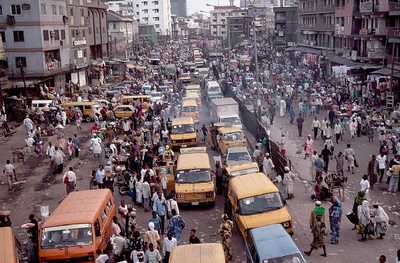


Lagos, Nigeria, is one of the largest cities in Africa south of the Sahara.
Individual Nigerians tend to identify first with their ethnicity, next their religion, and then their nationality. This helps explain the difficulty in uniting the country and in resolving disputes. People tend to take great pride in their heritage. Educated Nigerians usually avoid using the word “tribe,” preferring “ethnic group”; however, the average person is not insulted by the word “tribe” when discussing ethnicity.
Tensions exist between various groups due to their traditional spheres of influence, as well as past conflicts. For instance, the Igbo control some oil areas, and many have bitter feelings about the Biafra War; in 2000, some Igbo revived a call for independence. Yoruba tend to control the press and financial sector; they often led pro-democracy movements in the 1990s. The Hausa have generally held political and military control since independence. Former president Olusegun Obasanjo, a Yoruba, had his support base among the Hausa because of his past military ties.
Northerners tend to be quiet, reserved, and conservative in dealing with others. To them, raising the voice indicates anger. Southerners are more likely to be open and outgoing. They often enjoy public debate and arguing. They may shout to make a point or attract attention; shouting does not necessarily indicate anger. Daily life in Nigeria typically moves at a relaxed pace, with strict adherence to schedules rare.
"Nigeria: General Attitudes." CultureGrams Online Edition, ProQuest, 2023, online.culturegrams.com/world/world_country_sections.php?cid=115&cn=Nigeria&sname=General_Attitudes&snid=6. Accessed 15 September 2023.


"Infographic of Nigeria." CultureGrams Online Edition, ProQuest, 2023, online.culturegrams.com/world/world_popup_infographic.php?scountryname=Nigeria&id=&refername=&type=World. Accessed 15 September 2023.